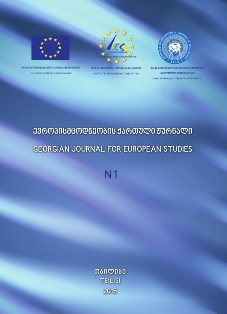The Challenges of the EU’s Policy of Non-recognition and Engagement
DOI:
https://doi.org/10.52340/gjes.2015.01.02Abstract
Following 2008 Russia-Georgia war and the establishment of new realities on the ground, the European Union elaborated the policy of non-recognition and engagement. This practically coincided with the elaboration and enforcement of the new policy by the Government of Georgia towards the occupied territories – “Engagement through Cooperation”. This paper aims to examine the major principles of policies of the EU and that of the Government of Georgia and to analyze their correlation. The paper argues that notwithstanding a number of similarities, the major distinction relates to the attempt on EU’s side to position itself as a neutral actor and consequently, disguise its partnership with the Georgian Government, while explicitly showing to the residents of the occupied territories that the rapprochement with the EU is only possible through relationship with the rest of Georgia remains of utmost importance for the Government of Georgia to achieve tangible results. The paper analyzes the outcomes that can reached in case the non-recognition and engagement policy of the EU is implemented independently from the policy of the Georgian Government.


